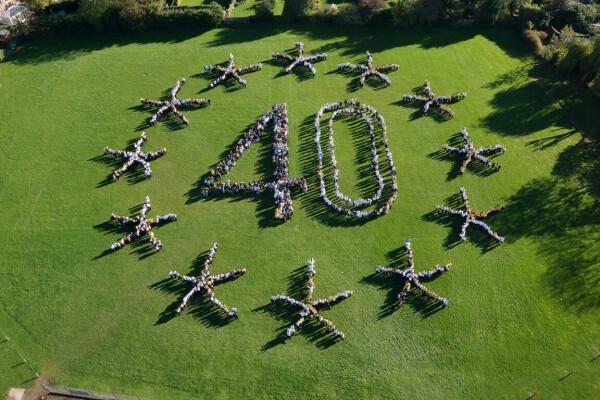School History

A school has existed on the present site in Willow Green, Ingatestone, Essex since September 1959. This site remained virtually unaltered until September 1973 when a period of rapid change and expansion commenced.
In competition with local grammar schools the “modern school” had struggled to recruit students and the local authority decided that it was not viable. However, following local protest, the authority decided to establish it as a school with a distinctly European dimension; this was, of course, coincident with the debate over UK membership of the Common Market.
It gave the Authority an opportunity to implement the decision they made in 1967 to develop a school in Essex “along European line”.
The school went from strength to strength and is now a successful 11-18 establishment with over 1150 students from a wide catchment area covering most of Essex and NE London. As part of its strong International ethos, each year almost 700 students travel overseas as part of the school’s links with International schools. In exchange, over 400 students visit the school on a reciprocal basis from France, Germany, Spain, Italy and China.
The first Headteacher of the Anglo-European School was Norman Pitt (1973-1990) who presided over a major building programme, which included a new language laboratory, a Sixth Form Block, an additional teaching space and improved Science laboratories. The curriculum steadily became enriched with its strong, all-pervading European dimension. European Studies was introduced to members of the fourth and fifth year and the European Study Visit Programme was introduced for all years and steadily expanded during the 1970s to include link schools in France, Germany, Norway and the U.S.A. In 1977 the school was the first state school to introduce the International Baccalaureate Diploma programme, an internationally recognised post-16 qualification which balances breadth with academic rigour.
In September 1990, Bob Reed, was appointed Headteacher and he too both instigated and presided over many changes including the extension of the European dimension to incorporate a more international perspective.
In September 1993 the school became Grant Maintained, placing full control of its finances, staff and overall management firmly in the hands of the Head Teacher and the School Governors. It returned to the local authority as a Foundation School in September, 1999. The most exciting challenge of all materialised in July 1995 when the school was designated a Language College by virtue of its on-going role as a centre of excellence in the teaching of languages.
This continued to expand and to embrace a more International ethos under the leadership of the Co-Headteachers, David Barrs and Jill Martin, with the notable expansion of links and three new school exchanges with China and the development of the Jiangsu Centre in 2008. There have also been two new Spanish exchanges and a new exchange to Italy introduced in 2009. The Headteachers also defined the five pillars which define the school and set it apart from others namely: Citizenship; languages; a broad baccalaureate curriculum including the arts and humanities; international visits and exchanges; the values, mission and vision of the IB. The co-headship model pioneered by the Anglo was further developed by the retirement of Jill Martin and the appointment of Jody Gee as co-head in September 2015. David Barrs retired in 2021 and Jody Gee became sole Headteacher.
Jean Monnet
Jean Monnet’s concept of a peace-promoting Europe, which shares its wealth with the world, lies at the heart of much of what the school does. Our aim is to provide the highest quality education enriched by an international ethos. The school provides an education for students in the local catchment area but also attracts a significant number of students, including non-UK nationals, who live in various parts of Essex and further afield.
The result is a multi-cultural society of young people who leave the school ready to play their part in shaping Europe and the world, proud of their own culture and tolerant of, and interested in, the culture of others. Indeed, the ethos that drives the school is critically important in a suburban, affluent, largely white Essex. There are few opportunities to engage in direct experience of other cultures. Attitudes can easily be driven by the stereotypes conveyed by the media. The school considers that part of its role is to challenge those stereotypes and help combat the racism that can arise from them.
The Anglo European School
The school is an 11-19, co-educational comprehensive school situated between Brentwood and Chelmsford, 30 minutes for Liverpool Street station.
It was opened in 1973 after the closure of a secondary modern school. The local residents of Ingatestone had campaigned to keep their local school open and the Local Authority, Essex, took the visionary step to establish a school with a “European Dimension”. The school would serve local needs but also draw students from a much wider sphere of influence. That sphere of influence now includes pretty much the whole of Essex and parts of London including Islington, Hackney, Tower Hamlets, Newham and Redbridge. We also draw students from Suffolk! As you can imagine, the railway line is our life-blood but students also arrive her by bus, car, foot and bicycle. Altogether 1350 students come to this school in the village of Ingatestone – and we are at the end of a cul-de-sac!
We have no evidence to prove it but there is a view that the local authority decision-makers at the time may have been influenced by the US ‘magnet’ school model. It was certainly the case that they saw it as an opportunity to consolidate the position of Essex as an important EU hub. The county faces Europe and the debate about our membership of the Common Market was as lively then (there was a referendum in 1975) as it is about our membership of the EU now.
Jean Monet gave us permission to use the EU flag as our logo but towards the end of the 1990s our ethos changed to embrace people from all over the world. ‘Anglo European’ is a misnomer but our reputation is built on it so we have never changed the name.
Some key milestones
1977 first UK state school to offer the International baccalaureate Diploma
1995 we became the first comprehensive school to become a specialist Language college
2005 we established the first co-headship model in a state secondary school
2010 first UK state school to offer the IB Career Programme
2011 we established the Anglo European Co-operative Educational Trust along with our local primary schools, the Anglia Ruskin University and the Co-operative Society
2011 we established the school as the Anglo European Co-operative Academy as part of the drive to make all schools independent companies within the state sector.
